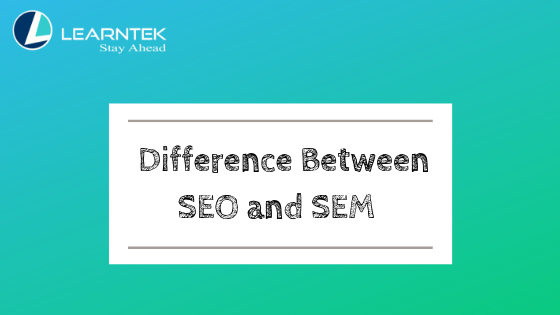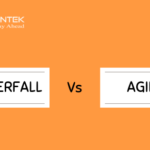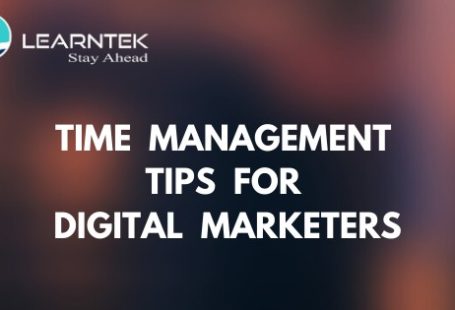The Difference Between SEO and SEM
Most digital marketing experts think that SEO and SEM are more or less two sides of the same coin even though they entail completely different actions and address varying areas of marketing. Often, you will find that the two terms are used to denote a similar set of actions and activities which can understandably be quite confusing for people with no previous exposure and knowledge. Here, we intend to sort out what each of these terms means exactly as well as define in clear-cut terms what the exact differences between the two are. Having a deep-rooted understanding of both these terms and their significance in the field of digital marketing is a must for anybody calling themselves a digital marketing professional.
What is SEO?
Apart from specialized knowledge in your preferred area of digital marketing, SEO must be a key part of every digital marketing professional’s strategy. It is a known fact that Google accounts for more than half of the total global search traffic. Thus it is important to focus the entire strength of your SEO strategy on Google, even though keeping an eye on Bing, Baidu and Yahoo wouldn’t hurt! There are an estimated 66,000 searchers per second on Goole every day. These stats were taken in 2017. These numbers have more than likely doubled right now and are only likely to increase over the years.
How Does SEO Work?
If you want your SEO strategy to make an impact, then it is important to understand how the process works exactly. In SEO, search engines are said to “crawl” on content. This basically means that they judge and evaluate the content on certain pre-defined criteria. These criteria include keywords, links, tags, etc. The search engine then awards the content a suitable rank based on its ability to attract organic traffic.
Some of the criteria that these so-called “crawlers” look for are –
- The Quality Of The Content
The importance of high-quality content cannot be emphasized enough. With high-quality content, you can impress the search engine and make an impression that your business is reputable and offers reliable products and services. High-quality content does not include just good grammar, informative, and easy-to-read content, but also content embedded with the right keywords and links.
- The User Experience
Another thing that will impress any search engine is a website with a streamlined designed that offers users a seamless and enjoyable user experience. The ease of navigation and speed also play a part in the overall ranking.
- Link Building
It is crucial to pay attention to whether you are backlinking to sites of good authority and legitimacy. You should also be able to clearly tell where your inbound links are originating from.
Learning the fundamental principles of Search Engine Optimization can be done by anybody. But what is important is implementing to the best of your abilities the most feasible strategy for your business and its products/services. When you learn about the intricacies of SEO and gain a concrete understanding of the inner workings of the entire process, then you will be confident enough to make better-informed decisions as part of your SEO strategy. It is also important to keep things in perspective, especially if you are a newcomer to the world of Search Engine Optimization and are eager to see results. As any experienced digital marketing professional will tell you, it takes time, sometimes even years, for Google to notice, recognize and reward your website.
What is SEM and How Does it Work?
Search Engine Marketing is a broad term that covers a variety of paid search advertising techniques and mechanisms. Google Ads are the most common example of Search Engine Marketing. Having a paid Google Ads program means that Google places your business at the very top of the page, even ahead of those with a top-notch SEO game going on. This digital marketing strategy, however, works better for those with a budget that can afford to make such expenses in order to achieve revenue growth and drive sales. Some of the most common of Seach Engine Marketing activities are as follows –
- Paid and targeted ad campaigns
- Incorporating choice keywords into the copy itself
- Making sure that add ad activities fall within the allocated budget
- Making use of CTR (click through rates), CPC (cost per click), and other metrics in order to device more-informed future advertising strategies
- Spending more time refining the design of your ads to ensure effectiveness.
If your entire digital marketing strategy is aimed towards brand recognition and if you have a budget that can spare some expenditure, then it is imperative that you opt for Search Engine Marketing as your overall digital marketing outlook. Another advantage of SEM is that since all ads involved are paid for, there is better accountability for your ROI. You can check up on and keep track of not just how your ads are faring but also help you in isolating your target audience so that over time, you can gradually focus your ad campaigns on the demographic that you have zeroed in on. Getting to know who your key demographic is will help you save on your expenditure for paid advertisements in the long-run. You could also completely scrap your SEM program and return to SEO, with the new found knowledge of the best keywords for your business, the most effective and attractive content, and your target audience.
It is, however, to be noted that some knowledge of tools such as Google AdSense would be required to gain a fair grip of your Search Engine Marketing strategy. However, even if you aren’t very keen on learning how to use such tools, you can always hire a professional who is well versed in reading your metrics and making sense of it. Make sure that you hire someone with fair exposure to web marketing as well as paid online advertising campaigns.
Conclusion
Overall, it is imperative for any digital marketing professional worth their salt to have fair mastery over both Search Engine Optimization and Search Engine Marketing. This is because having a deep-rooted understanding of both will help you make better-informed and selective marketing decisions that best suit your own business as well as its products and services.






